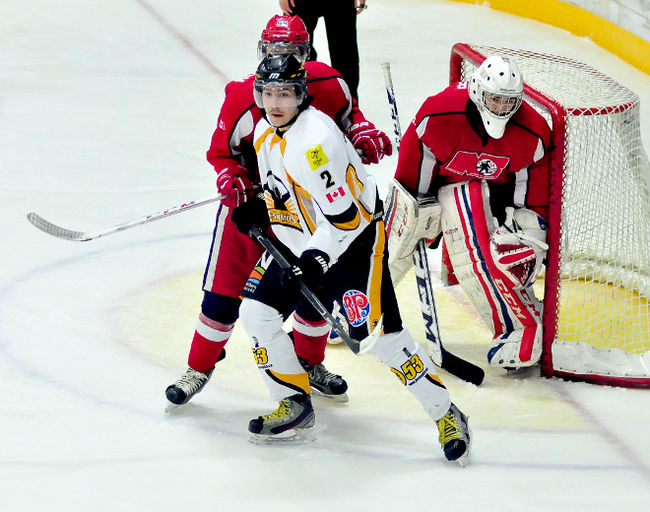TIMMINS - The Copeland Cup has yet to be awarded, but it appears the Northern Ontario Junior ‘A’ Hockey League will have a significantly different look for the 2014-15 campaign.
With the Thunderbirds and the Gold Miners set to play Game 6 of their best-of-seven championship series Tuesday night in Kirkland Lake, the league has announced formal approval of the move of the Trappers to Mattawa from North Bay.
The Trappers played their final four regular-season home games, as well as their two home games during their opening round playoff loss to the Gold Miners, out of the Mike Rodden Arena, so the move shouldn’t come as a big surprise.
Nor would it be surprising to see the NOJHL approve a new franchise for North Bay in time for the 2014-15 season.
“Hypothetically, there is interest in North Bay, by a group to put a team in for next year,” said NOJHL commissioner Robert Mazzuca.
“There is a process involved. First they have to secure ice at the facilities in North Bay and once they have that they make an application to the league and the board will decided whether we accept it, or not.
“If we accept it, then we submit it to the NOHA and then from the NOHA (Northern Ontario Hockey Association) it goes to the OHF (Ontario Hockey Federation) and Hockey Canada, which is basically a rubber stamp.
It is still too early to say how many teams the NOJHL will operate with for the 2014-15 season and where they will be located.
“I will have a pretty good idea in the next couple of weeks where we are headed, in terms of numbers,” Mazzuca said.
“We know we are going to operate with a minimum of seven and we could be at eight, or we could be at nine.”
The move of the Trappers to Mattawa from North Bay is the second franchise relocation approved for the 2014-15 season.
In early March it was announced that the Bobcats would be moving to Cochrane from Elliot Lake and would be known as the Crunch.
While hockey fans in Timmins remain hopeful that junior hockey will one day return to the City with the Heart of Gold, it does not appear that will be the case for the 2014-15 season.
“I have not received a phone call from anybody,” Mazzuca said.
“At no time, during the three years I have been here, have I spoken to anybody interested in locating a team in Timmins.
“And there is a rule, an 80 kilometre rule, within the constitution, that protects our teams.
“So, if somebody wanted to put a team in Rayside, for example, they would have to get approval from the board, which would have to be unanimous if it was within the 80 kilometres, just like when the Trappers moved to Espanola, from North Bay, they had to get approval.”
The same thing applied when the Bobcats moved to Cochrane, within the 80-kilometre zone of the Abitibi Eskimos.
Relocation of the two franchises may not be the only change for the NOJHL, however.
Tim Clayden, owner of the Espanola Rivermen, announced to the world earlier this spring that he is pulling his franchise out of the NOJHL and will instead operate it out of the newly created Canadian International Junior Hockey League starting in 2014-15.
As of April 11, however, the NOJHL had not received formal notice from Clayden with regards to his intentions.
“He has made public declarations that he is leaving, but the league has not received any formal legal notification that he is leaving,” Mazzuca said.
“He would have to send a written letter of notification, notifying the league that he would not be participating, or being a part of the NOJHL.
“That’s one way to do it, for sure.”
The commissioner hesitated when asked if that would be the normal procedure for a club to follow under the circumstances.
“I can’t explain, or rationalize what Tim does, or doesn’t do,” he said.
“Yeah, I would say it is unusual, because within the framework of what the league has for rules and regulations there are certain things you can and can’t say and how you can say it and when you can say it.
“There are sanctions for doing stuff.
“It is not surprising, left me put it to you that way. It is an unusual format, but obviously he has got an axe to grind and that’s the way it goes.”
Despite Clayden’s proclamations that the Rivermen will bolt for the CIJHL, there remains an outside chance that the NOJHL could still have a franchise in Espanola for the 2014-15 season.
“One possibility is somebody could purchase that membership and operate … get a lease with the city and get approval from the league, that is a possibility, sure,” Mazzuca said.
“If there is a person, or group that wanted to purchase it and they could come to an agreement, they would have to make an application for transfer of ownership and there is a process that we have within our constitution that would have to be followed. It would go to the board of directors to decide.”
It may be some time yet, before we have a clear picture of what the NOJHL will look like for the 2014-15 season and beyond.
“Normally any applications for new teams applying for membership next year, they would have to apply to the league, like we had a U.S.-based group make an application to the league for entry next year and the league considered that and for a couple of reasons they turned it down this year,” Mazzuca said.
“It makes more sense to have two teams from the United States and we almost had two, but there was only one and it is a transportation and cost factor.
“But there is a process that is followed for applications and discussions are ongoing for next year for a few new teams.
“Our budgeting and our scheduling meeting is not held until the third week in June.”
The limit of America players on the rosters of NOJHL teams for the 2014-15 season will be decreasing to six, from the current seven.
“Two years ago, if you had a player from the OHF they were not classified as imports, but if you had a player from Quebec, or another province, they were classified as imports and Americans were classified as imports,” Mazzuca said.
“Then last year the status changed, so that any and all Canadians are considered to be non-imports. You can get players from B.C., Alberta, Saskatchewan, Quebec, or the Maritimes and they are no longer classified as imports. Only Americans are classified as imports now.
“If you look at this year’s teams and you go through the list you can see who is from the United States and who is isn’t from the United States and if you go back to last year and you go through the number of Americans playing with the North Bay Trappers when they won the NOJHL championship, they had five Americans, that is all, but they had three players from Quebec, who were considered to be imports. They had the maximum number (eight for the 2012-13 season), but three of them were Canadian and five of them were Americans.”
At one time, a number of years ago, NOJHL teams were also allowed to use European players, something that Mazzuca wouldn’t mind seeing return.
“It’s a Hockey Canada decision,” he said.
“From my point of view, I disagree with it. I have a hard time distinguishing the difference between a kid from Saginaw, Mich., and a kid from Stockholm, Sweden, as imports.
“I have a bit of difficulty trying to swallow that argument and also the fact that Hockey Canada says were are here to develop Canadians on one hand, but when you look closely the CHL said they weren’t going to draft European goalies and yet in the second round of this year’s draft Leo Lazarev, an import from Russia, who played in Waterloo, is drafted by Ottawa.
“And if you look really close, and you really spend time, going through the OHL Cup you can go through each team and you will see probably, I would safely say, 25-plus Europeans playing hockey in the GTHL (Greater Toronto Hockey League), so I have a bit of a problem with that logic.
“But that is what Hockey Canada and the OHF decided. There are residence rules. Let’s say Ma and Pa Lazarev want to come and live and work in Timmins … Pa wants to work for Goldcorp and Ma wants to work for the school board … and they file a residency permit. They have to get permission and go through an appeals process and then it is decided whether they qualify under the residency rule.
“We could do that, as well, and probably some of our teams might, but I don’t know if the appetite is there, because there are fees involved and stuff, but I just find it is contradictory to the whole process.”





















